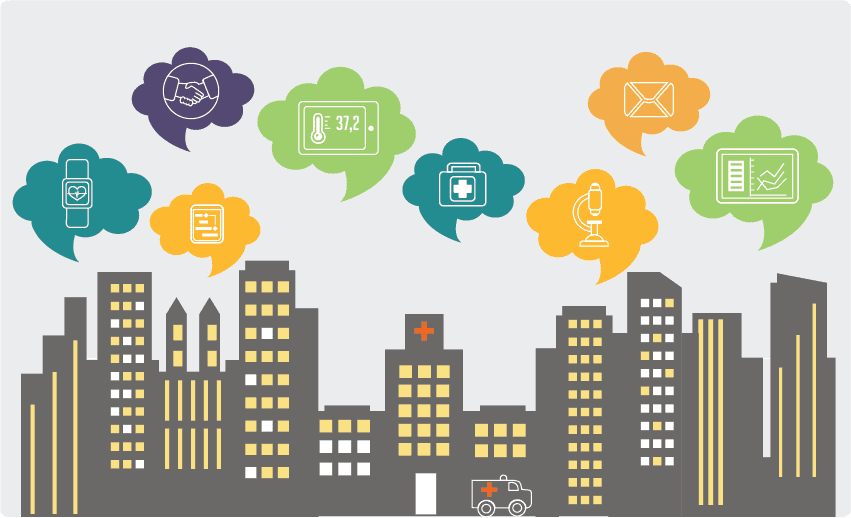5 business strategies created by IoT for healthcare companies
There are numerous ways to grow your business and client base. One way to stay ahead is to look for opportunities emanating from new technological advancements. One such opportunity comes from advancements is connectivity between hardware and applications, and don’t forget the troves of data collected as a result. If you are a company currently striving to make a footprint in healthcare, you can achieve this goal rapidly by implementing IoT technology. IoT is making possible for a new generation of medical solutions that can significantly boost your core value proposition for healthcare companies, and in turn attract new partners and clients. The key to success in this new IoT-powered landscape is to become the main attraction and not just be a peripheral satellite.

In our recent Healthcare webinar and the technology ownership blog post we explained how an IoT platform can help healthcare service providers and medtech companies rapidly advance in the field. Owning and maintaining their IoT platforms could make them big players in rapidly IoTized medical industry. Moreover, an IoT platform opens for a number of new monetization models, which are not accessible to companies who take no part in establishing IoT ecosystems:
 Joint IoT ecosystems
Joint IoT ecosystems
Healthcare companies can use their IoT platforms to coordinate work between separate medical units or involve third-party service providers into their medical service delivery, thus extending the scope and scale of healthcare services. For example, a hospital could immediately connect their patients to a third-party ambulance or taxi service in case there are no available vehicles in their own garage at the moment. Another convenient option is automated data exchange between a healthcare institution and a medical lab or a health resort where patients can receive additional treatment. These joint IoT ecosystems allow healthcare service providers to offer comprehensive healthcare services to their clients and keep an eye on the treatment process end to end.
 Remote healthcare programs
Remote healthcare programs
Remote patient monitoring holds the supreme value for healthcare companies. These solutions are getting widespread, so more and more people are inclined to use them for disease prevention. Healthcare service providers can use these smart monitoring devices to create subscription plans for their clients when patients pay a monthly fee for a particular set of remote monitoring services. Using an IoT platform is an essential prerequisite in this case since these treatment plans will involve connecting a number of different smart devices, adjusting them for individual patient needs, and continuously enhancing this type of treatment with new devices, features, and analytics algorithms.
 Partnerships between healthcare companies and medtech vendors
Partnerships between healthcare companies and medtech vendors
Both healthcare companies and medtech vendors can benefit from partnerships around IoT-powered devices and solutions. Together they can develop specific treatment solutions that can have a good traction among patients. Healthcare companies can provide valuable feedback to manufacturers while the latter would implement solutions that are easily integrated into their partner’s hospital ecosystems. In this way, new devices and services can be introduced much faster and function as expected.
 Analytics as a service
Analytics as a service
Health data analytics can be offered by larger healthcare companies
as a service to
those companies who don’t have this capability. Also, analytics can be incorporated into existing offerings of a healthcare
service
provider to deliver a new range of healthcare programs for patients. Among them are early disease diagnosis and preventive
treatment.
Analytics can be of great value for device vendors too, as they can enable predictive maintenance over their products and
thus additionally
monetize on the top-level reliability of their solutions.
 Public health projects
Public health projects
Last but not the least, comprehensive IoT medical platforms can help healthcare companies undertake modern public health programs sponsored by government and charity funds. Having an IoT platform would be an especially significant advantage for large-scale IoT projects in healthcare, which might involve a fleet of different devices and sophisticated connectivity requirements. An IoT platform also would take care of elastic scalability for such solutions and end-to-end data security.
The IoT technology opens a new dimension of business opportunities for healthcare companies and the IoT platform becomes a key artifact in this transformation. Early movers, who are taking a proactive approach to establishing their IoT ecosystems, will tap into new business models and lead the way for runner-ups. Staying out of the IoT range will be the privilege of no one.
Milena Sidler
SVP Product & Sales at KaaIoT
Looking for a powerful IoT platform?
Related Stories
- Business
Business guide to IoT data analytics
As a key part of modern IoT solutions, IoT data analytics enable businesses and IoT enthusiasts to convert data collected from their...






